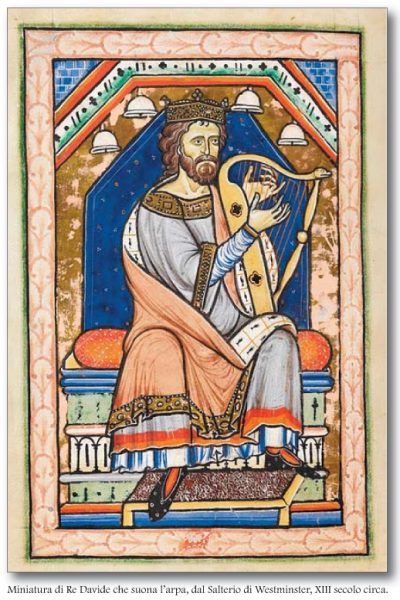Saint Ambrose on the Psalms

When Words Soar to a Higher Level
Though all Scripture is fragrant with God’s grace, the Book of Psalms has a special attractiveness. Moses wrote the history of Israel’s forefathers in prose, but after leading the people through the Red Sea–a wonder that remained in their memory–he broke into a song of triumph in praise of God when he saw King Pharaoh drowned along with his forces. His genius soared to a higher level, to match an accomplishment beyond his own powers. Miriam too raised her timbrel and sang encouragement for the rest of the women, saying: Let us sing to the Lord, for he has triumphed gloriously; he has cast horse and rider into the sea.
Healing in the Psalms
In the Book of Psalms there is profit for all, with healing power for our salvation. There is instruction from history, teaching from the law, prediction from prophecy, chastisement from denunciation, persuasion from moral preaching. All who read it may find the cure for their own individual failings. All with eyes to see can discover in it a complete gymnasium for the soul, a stadium for all the virtues, equipped for every kind of exercise; it is for each to choose the kind he judges best to help him gain the prize.
A Treasure for the Memory
If you wish to read and imitate the deeds of the past, you will find the whole history of the Israelites in a single psalm: in one short reading you can amass a treasure for the memory. If you want to study the power of the law, which is summed up in the bond of charity (Whoever loves his neighbor has fulfilled the law), you may read in the psalms of the great love with which one man faced serious dangers singlehandedly in order to remove the shame of the whole people. You will find the glory of charity more than a match for the parade of power.
Prophecy
What am I to say of the grace of prophecy? We see that what others hinted at in riddles was promised openly and clearly to the psalmist alone: the Lord Jesus was to be born of his seed, according to the word of the Lord, I will place upon your throne one who is the fruit of your flesh.
In the psalms, then, not only is Jesus born for us, he also undergoes his saving passion in his body, he lies in death, he rises again, he ascends into heaven, he sits at the right hand of the Father. What no man would have dared to say was foretold by the psalmist alone, and afterward proclaimed by the Lord himself in the Gospel.
Psalms at Daybreak and at Nightfall
What is more pleasing than a psalm? David expresses it well: Praise the Lord, for a song of praise is good: let there be praise of our God with gladness and grace. Yes, a psalm is a blessing on the lips of the people, a hymn in praise of God, the assembly’s homage, a general acclamation, a word that speaks for all, the voice of the Church, a confession of faith in song. It is the voice of complete assent, the joy of freedom, a cry of happiness, the echo of gladness. It soothes the temper, distracts from care, lightens the burden of sorrow. It is a source of security at night, a lesson in wisdom by day. It is a shield when we are afraid, a celebration of holiness, a vision of serenity, a promise of peace and harmony. It is like a lyre, evoking harmony from a blend of notes. Day begins to the music of a psalm. Day closes to the echo of a psalm.
A Song for the Beloved
In a psalm, instruction vies with beauty. We sing for pleasure. We learn for our profit. What experience is not covered by a reading of the psalms? I come across the words: A song for the beloved, and I am aflame with desire for God’s love. I go through God’s revelation in all its beauty, the intimations of resurrection, the gifts of his promise. I learn to avoid sin. I see my mistake in feeling ashamed of repentance for my sins.
Death and Resurrection
What is a psalm but a musical instrument to give expression to all the virtues? The psalmist of old used it, with the aid of the Holy Spirit, to make earth re-echo the music of heaven. He used the dead gut of strings to create harmony from a variety of notes, in order to send up to heaven the song of God’s praise. In doing so he taught us that we must first die to sin, and then create in our lives on earth a harmony through virtuous deeds, if the grace of our devotion is to reach up to the Lord.
A Song for the Whole Man
David thus taught us that we must sing an interior song of praise, like Saint Paul, who tells us: I shall pray in spirit, and also with understanding; I shall sing in spirit, and also with understanding. We must fashion our lives and shape our actions in the light of the things that are above. We must not allow pleasure to awaken bodily passions, which weigh our soul down instead of freeing it. The holy prophet told us that his songs of praise were to celebrate the freeing of his soul, when he said: I shall sing to you, God, on the Lyre, holy one of Israel; my lips will rejoice when I have sung to you, and my soul also, which you have set free.
(From The Explanation on the Psalms by Saint Ambrose of Milan)
